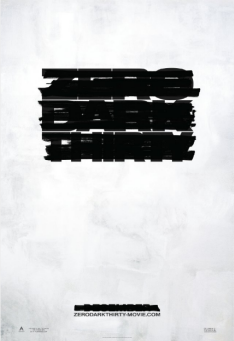Print Edition: January 23, 2013
 Objectivity is a word thrown around in a way usually linked with reality, professionalism and hard data – it is better than, more mature than, its lesser forms: opinion, emotion, margins of error. In one of the many explanations of the various methods of doing what the people in Zero Dark Thirty are trying to do (find logic, patterns, traceable movements in clusters of half-recorded information) that ideal of objectivity—this is all “deductive reasoning”—is brought up as a way to close off criticism. But Kathryn Bigelow’s movie about tangled post-9/11 national intelligence threads has a central organizing principle: Maya, the figure played by Jessica Chastain. Through her, every equal-sided deliberation or expansive survey, there is always subjectivity in what is being done – whether it is specific to this person or where she comes from.
Objectivity is a word thrown around in a way usually linked with reality, professionalism and hard data – it is better than, more mature than, its lesser forms: opinion, emotion, margins of error. In one of the many explanations of the various methods of doing what the people in Zero Dark Thirty are trying to do (find logic, patterns, traceable movements in clusters of half-recorded information) that ideal of objectivity—this is all “deductive reasoning”—is brought up as a way to close off criticism. But Kathryn Bigelow’s movie about tangled post-9/11 national intelligence threads has a central organizing principle: Maya, the figure played by Jessica Chastain. Through her, every equal-sided deliberation or expansive survey, there is always subjectivity in what is being done – whether it is specific to this person or where she comes from.
Bigelow and screenwriter Mark Boal approach the past 10 years of American involvement in Afghanistan and Pakistan with a net-like structure, covering as much as possible, casting everything (seemingly) in equal light, probing into both dead ends and leads with fine detail, but Zero Dark Thirty is defined by its limitations: it can only (and pointedly only) show the point of view of Americans, even as they occupy territory and bodies not their own. When crises strike, or there is any kind of venturing out that reveals the deprivation or compromised landscape outside but just around the investigation, there is never any more than the mere acknowledgment by the camera that this exists – there are jobs to do that mean none of this is an active concern, at least in the minds of the movie’s focal points. Much of Zero Dark Thirty takes place in camps or undisclosed locations that only exist because of American dominance, moving into other countries and setting up structures or temporary bases, but despite the on-location sense of the movie, Chastain and those that work over her are primarily shot indoors, as replays and re-reads and meetings take place to find what is impossible to perceive in the world outside.
At one point, in the seconds before a gruesome scene, Dan (Jason Clarke) says to Maya “There’s no shame if you want to watch from a monitor.” It’s a line that carries all kinds of weight, from what it means as an audience address, to what it comes to mean for Maya as the bulk of the search will be carried out via similar methods, and similar methods as viewed from a screen. While the records and documents and intelligence reports are all sortable, all manageable, what everything in Zero Dark Thirty comes down to is that what is being worked toward is human life. Characterization of all the people carrying this out is rendered with an opacity that makes it easy to forget what this looks like—there is no inner life (or the inner life is beaten down) there is only the work—and every turn towards new insight is taken through more cost, more damage. A particularly laborious point is directed at Dan’s keeping of monkeys on the base, and how they are more valued than any human we’ve seen him deal with, but it necessarily points toward the larger picture – where is the line drawn between lives that matter and lives that don’t, if there is one that isn’t changeable in a screen-depicted instant? When explosions and aridness and torture and surveillance are all blanketed by the mediated sense of the image, and every image is noteworthy only for its use, everything is objectified. Passing judgment is a mess that has no end here (“How do you evaluate the risk of not doing something?”) so while Zero Dark Thirty’s procedural elements might draw comparisons to lengthy series like The Wire or Rubicon, this is one drained of all colour, free action or choice that might lead to gain.
One of the first unnerving moments in Zero Dark Thirty is when Jessica Chastain delivers the line “You can help yourself by being truthful” with an automated, post-human deliberation, despite the natural reaction shots to what is happening Bigelow has returned to as balance for the surrounding murk. Bigelow does not allow for catharsis (as opposed to a symbol to direct hate towards, bin Laden is just another figure on a screen here) clarity (everything is awash in weary, sleepless study) or for anything new to be gleaned. It muddies what is known, and in its climax has nothing that couldn’t have been learned from the New Yorker account of the event published a matter of months after it occurred. Zero Dark Thirty stays inside the messy dealings of the American side, the obsession to find a solution where solutions are obsolete. Despite being “first” to the topic, it has company in post-9/11 films like Steven Spielberg’s Munich or Julia Loktev’s Day Night Day Night that focus on unrelated personal stories to expand on the greater whole, but if Zero Dark Thirty doesn’t reach in the same way those do, it is entirely by design.

